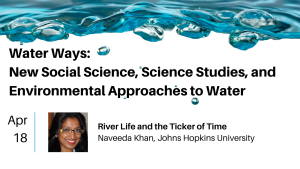Presented By: Institute for Social Research
River Life and the Ticker of Time
Water Ways: New Social Science, Science Studies, and Environmental Approaches to Water

River Life and the Ticker of Time
Naveeda Khan, Johns Hopkins University
Monday, Apr. 18, Open Talks will be held noon to 1pm, and the Grad Workshops will be held 1 to 3pm.
Join us via Zoom.
Abstract:
My talk starts with an examination of Padma Nodir Majhi (The Boatman of the Padma), the 1936 novella by Manik Bandopadhaya, to draw out the attention it lavishes on the Padma River. There are the usual anthropomorphic depictions of the river as a capricious woman, bountiful and destructive in turn, but also much in the way of descriptions of the waxing and waning depth of the river, the flow patterns, the color of the water, the dissolved matter in it, the taste of it, and the fishes and other marine life. Each is a chronotope in the literary sense of configuring time, space, and subjectivity in particular ways, but also a ticker of time in the sense of marking the objective state of the river at a particular moment. But again, the anthropomorphic inflections of our language break through with the ticker indicating the beating heart of the river, the river oft described has having a wavering and flickering heart. I examine these tensions between poetic figurations and objective descriptions of the river in the novel, following them across the filmic register to two art films based on the novel, Jago Hua Severa (The Dawn will Break, 1959) and Padma Nodir Majhi (1993) and finally across the scientific register to current studies of the river, with its focus on fluvial channel dynamics, metal content in the river and declining state of fish species. I explore how anthropology inherits this tension with its encounters not just with people but with texts and media by and about them and what anthropology does or can do with this tension to realize what Katherine McKittrick calls living outside of prevailing knowledge systems by reciting and recasting human-environment interactions.
This is a part of the Research Center for Group Dynamics (RCGD) Winter 2022 Series - "Water Ways: New Social Science, Science Studies, and Environmental Approaches to Water"
This is also a part of the class Anthrcul 558 section 002
Naveeda Khan, Johns Hopkins University
Monday, Apr. 18, Open Talks will be held noon to 1pm, and the Grad Workshops will be held 1 to 3pm.
Join us via Zoom.
Abstract:
My talk starts with an examination of Padma Nodir Majhi (The Boatman of the Padma), the 1936 novella by Manik Bandopadhaya, to draw out the attention it lavishes on the Padma River. There are the usual anthropomorphic depictions of the river as a capricious woman, bountiful and destructive in turn, but also much in the way of descriptions of the waxing and waning depth of the river, the flow patterns, the color of the water, the dissolved matter in it, the taste of it, and the fishes and other marine life. Each is a chronotope in the literary sense of configuring time, space, and subjectivity in particular ways, but also a ticker of time in the sense of marking the objective state of the river at a particular moment. But again, the anthropomorphic inflections of our language break through with the ticker indicating the beating heart of the river, the river oft described has having a wavering and flickering heart. I examine these tensions between poetic figurations and objective descriptions of the river in the novel, following them across the filmic register to two art films based on the novel, Jago Hua Severa (The Dawn will Break, 1959) and Padma Nodir Majhi (1993) and finally across the scientific register to current studies of the river, with its focus on fluvial channel dynamics, metal content in the river and declining state of fish species. I explore how anthropology inherits this tension with its encounters not just with people but with texts and media by and about them and what anthropology does or can do with this tension to realize what Katherine McKittrick calls living outside of prevailing knowledge systems by reciting and recasting human-environment interactions.
This is a part of the Research Center for Group Dynamics (RCGD) Winter 2022 Series - "Water Ways: New Social Science, Science Studies, and Environmental Approaches to Water"
This is also a part of the class Anthrcul 558 section 002